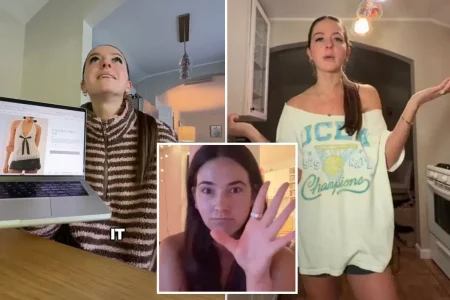Navigating Life’s Unexpected Turns: Insights from Dear Abby
In a world filled with complex relationships, unexpected revelations, and emotional challenges, people often seek guidance to help them navigate life’s unpredictable journey. Dear Abby’s advice column continues to be a trusted resource for those facing personal dilemmas, offering compassionate wisdom that resonates with readers of all backgrounds. Two recent letters showcase particularly delicate situations that many might find themselves in: one involving a newlywed confronting potentially troubling information about her spouse, and another featuring a younger person developing feelings for an older friend. These cases highlight how trust, communication, and emotional honesty remain essential components of healthy relationships, regardless of the specific circumstances.
The first letter comes from a recently married woman in Canada who received an anonymous message claiming her husband has Asperger’s syndrome, a condition on the autism spectrum. This revelation, while confirming her own suspicions, has triggered significant anxiety and trust issues for her. The timing couldn’t be worse as she’s still grieving her mother’s recent death from cancer. Her past relationship with a dishonest narcissist has left emotional scars, making her particularly sensitive to what she perceives as another potential betrayal. The situation raises important questions about trust, communication, and how we process third-party information about our loved ones. Abby wisely points out that anonymous messages often aim to cause trouble rather than help, and encourages the writer to educate herself about autism spectrum conditions through reliable resources before approaching her husband. The distinction between deliberate deception and being in denial about a neurological condition is crucial, as is understanding that many successful individuals live with autism spectrum conditions without it diminishing their capacity for meaningful relationships.
The second letter presents a different but equally complex emotional situation. A 32-year-old individual has developed romantic feelings for their 57-year-old best friend and co-worker, a widow still adjusting to life two years after losing her husband. The age difference, their established friendship, and workplace dynamics all complicate the situation, creating understandable hesitation. The letter writer experiences physical signs of attraction—heart skipping beats when their eyes meet or fingers accidentally touch—and fears both rejection and losing a valued friendship. This scenario reflects how human connections can evolve in unexpected ways, transcending conventional boundaries of age or initial context. Abby’s advice emphasizes clear communication and respecting boundaries, suggesting a casual setting to explore whether these feelings might be reciprocated, while acknowledging the potential workplace complications that could arise if the relationship develops romantically.
Both scenarios highlight how relationships require courage—the courage to seek truth, to express genuine feelings, and to face potential rejection or disappointment. The first letter writer must summon the courage to address potential neurodiversity in her new marriage without letting past relationship trauma color her perception of her current spouse. Anonymous messages can be particularly damaging because they plant seeds of doubt without accountability, leaving the recipient to sort through the emotional aftermath alone. Organizations like the Association for Autism and Neurodiversity can provide valuable resources for those seeking to understand how autism spectrum conditions manifest in adults and how they affect relationships. With proper understanding and communication, couples can navigate these differences successfully, often finding that neurodiversity brings unique strengths and perspectives to their partnership.
For the second letter writer, the courage required involves risking a valued friendship for the possibility of a deeper connection. Age differences in relationships often trigger social judgment, yet many successful partnerships exist between people of significantly different ages. The key factors are mutual respect, compatible life goals, and emotional maturity. Abby’s suggestion to approach the conversation gradually—first gauging comfort with the age difference before expressing deeper feelings—respects both parties’ autonomy and the existing friendship. The additional complexity of being co-workers adds another layer of consideration, as workplace relationships can affect professional dynamics and may even conflict with company policies. This reminds us that romantic feelings don’t exist in isolation but within broader social contexts that influence their expression and outcome.
These letters illustrate how life rarely follows predictable patterns and how connections between people—whether marital, friendly, or professional—contain layers of complexity that require thoughtful navigation. The anonymous message sender in the first scenario demonstrates how third parties can disrupt relationships, while the second letter shows how our own evolving feelings can create internal turmoil. Both situations call for similar responses: seeking reliable information, honest communication, respect for boundaries, and preparation for all possible outcomes. Dear Abby’s enduring appeal lies in recognizing these universal human experiences and addressing them with practical wisdom that acknowledges both emotional realities and social considerations.
In an era where relationships are increasingly complex and definitions of family and partnership continue to evolve, columns like Dear Abby provide not just advice but community—a reminder that our personal struggles connect us to countless others facing similar challenges. Whether dealing with potential neurodiversity in a marriage or navigating age-gap attraction, the fundamental principles remain consistent: approach others with honesty, respect, and compassion; make decisions based on reliable information rather than fear; and recognize that meaningful connections sometimes require risking vulnerability. As these letter writers face their respective challenges, they remind us that the heart’s journey rarely follows a straight path, but with thoughtful guidance and courage, even the most complicated situations can lead to growth and deeper understanding.















